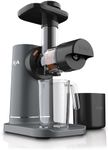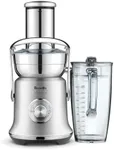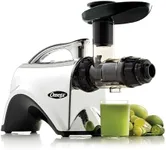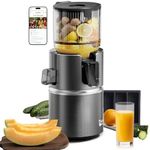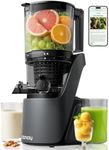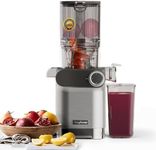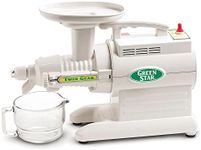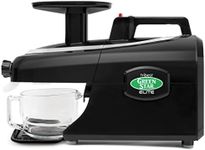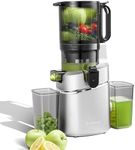Buying Guide for the Best Cold Press Juicers
Choosing a cold-press juicer can be a rewarding decision if you want to enjoy fresh, nutrient-rich juices at home. Cold-press juicers, also known as masticating juicers, work by slowly crushing and pressing fruits and vegetables to extract juice, which helps preserve more vitamins and enzymes compared to traditional juicers. When picking the right cold-press juicer, it's important to consider how often you'll use it, what types of produce you want to juice, and how much space you have in your kitchen. Understanding the key features will help you find a juicer that fits your lifestyle and needs.Juicing Speed (RPM)Juicing speed, measured in revolutions per minute (RPM), tells you how fast the juicer's auger turns to crush and press produce. Lower speeds (typically 40-80 RPM) are better for preserving nutrients and minimizing heat, which is ideal if you want the healthiest juice possible. Medium speeds (80-120 RPM) offer a balance between juice quality and speed, making them suitable for most users. Higher speeds (above 120 RPM) can process juice faster but may generate more heat and oxidation, which can reduce the nutritional value. If you prioritize maximum nutrition and don't mind waiting a bit longer, go for a lower RPM. If you want quicker results and are less concerned about slight nutrient loss, a higher RPM may suit you.
Feed Chute SizeThe feed chute is the opening where you insert fruits and vegetables. A larger feed chute allows you to put in bigger pieces or even whole produce, which saves time on chopping and preparation. Smaller chutes require more cutting and prep work but can be safer, especially if you have children helping in the kitchen. If you value convenience and want to juice quickly, look for a juicer with a wide feed chute. If safety or compactness is more important, a smaller chute might be better.
Juice YieldJuice yield refers to how much juice you get from a given amount of produce. Higher juice yield means less waste and more juice for your money. Some juicers are better at extracting juice from leafy greens, while others excel with hard fruits and vegetables. If you plan to juice a lot of greens or want to maximize every drop, look for a model known for high juice yield. If you mostly juice fruits or don't mind a bit of leftover pulp, this may be less critical.
Ease of CleaningCleaning a juicer can be time-consuming, so it's important to consider how easy it is to take apart and wash the parts. Some juicers have fewer components and are dishwasher-safe, making cleanup quick and simple. Others may have more intricate parts that require hand washing. If you plan to juice daily or want a hassle-free experience, prioritize models that are easy to clean. If you don't mind spending extra time on maintenance, this may be less of a concern.
Noise LevelCold-press juicers are generally quieter than traditional centrifugal juicers, but noise levels can still vary. If you live in a shared space, have young children, or prefer a quieter kitchen, look for a juicer that operates at a lower noise level. If noise isn't an issue for you, this may not be a deciding factor.
Size and StorageJuicers come in various sizes, from compact models that fit easily on a countertop to larger units that may require more storage space. Consider how much room you have in your kitchen and whether you want to keep the juicer out or store it away after each use. If space is limited, a smaller or more portable model may be best. If you have plenty of counter space and plan to juice often, a larger model could be more convenient.
VersatilitySome cold-press juicers can do more than just juice; they may also make nut milks, sorbets, or even pasta. If you want a multi-purpose appliance, look for a model with extra attachments or functions. If you only plan to make juice, a simpler model may be all you need.


